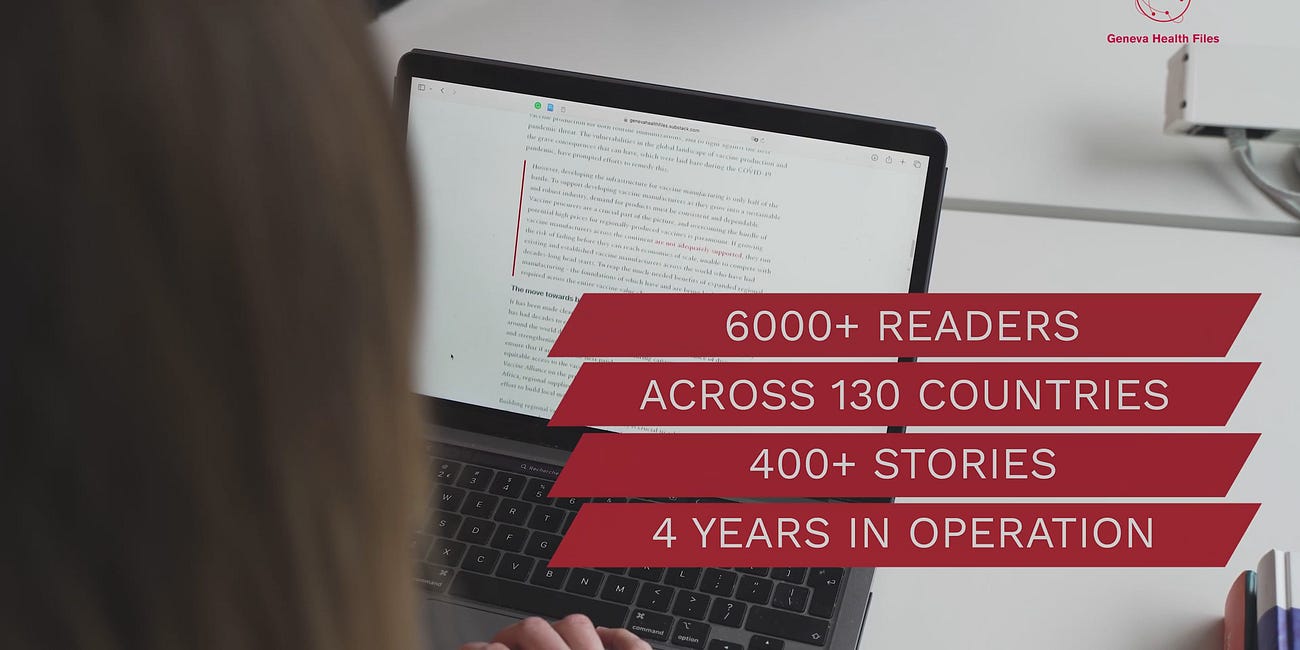Geneva Health Files January-March 2025 [The GHF WRAP]
The Q1 2025 Roundup from Geneva Health Files
Dear Readers,
Presenting the first wrap of 2025 that captures the last three months of our reportage.
My colleague Sana Ali has compiled this for you.
Support public interest global health journalism, become a paying subscriber. Tracking global health policy-making in Geneva is tough and expensive. Help us raise important questions, and in keeping an ear to the ground. Readers paying for our work makes this possible.
Our gratitude to our subscribers who help us stay in the game!
More soon!
Best,
Priti Patnaik & Sana Ali
Feel free to write to us: patnaik.reporting@gmail.com or Follow us on Twitter: @filesgeneva
Highlights: January-March 2025
Compiled by Sana Ali
Treaty talks
[April 2] EU Countries Divided Over European Commission’s Role in the Pandemic Treaty Negotiations, Disagreement On Technology Transfer
There are rumblings among some European Union member states on the role of the European Commission in the negotiations on the Pandemic Agreement, particularly on the obligations on technology transfer, sources familiar with the dynamics told Geneva Health Files.
[Feb 21] Countries Closer Than Before As Geopolitics Reshapes Dynamics In Pandemic Treaty Talks; Agreement Hinges On Pathogen Access & Benefits Sharing
As Brussels tries to find a footing, and re-evaluates its strategies in a starkly different geopolitical landscape, the dynamics in the Pandemic Treaty Talks is reflecting an unmistakable shift with a more “constructive role” being played by the European Union, diplomats in the negotiations are of the view. This could have an impact on if and how soon, WHO member states reach closer to consensus in a Pandemic Agreement.
[Feb 18] The Pandemic Agreement Talks Without the U.S., A Gamechanger?
The double whammy of worsening geopolitics and an uncertain financial climate for global health, is shaping the negotiations for a new Pandemic Agreement in a slow but sure way.
WHO member states are convening this week for the 13th meeting of the Intergovernmental Negotiating Body (INB) in bid to tackle the toughest sticking points that have distilled through three years of this negotiating process including framing obligations on prevention, technology transfer, pathogen access and benefits sharing, among others.
[Feb 13] Technology Transfer in Global Health – A Post-Pandemic Reckoning for WHO Member States
Obligations on technology transfer have been one of the most difficult discussions in the ongoing negotiations towards a Pandemic Agreement at the World Health Organization. The topic is charged, and has a chequered history in international development across many forums. The failure to ensure technology transfer over the decades, culminated in a demand for a temporary suspension on intellectual property rules at the World Trade Organization, when at the height of the COVID-19 pandemic, developing countries made a desperate bid to diversify manufacturing to meet the global demand for medical products. These largely efforts failed.
The Files-in Depth
[Mar 31] WHO proposes a Billion Dollar Cut to its Budget for 2026-27 to US$4.2 billion, DG Signals Plans to Shed Jobs Citing $600 Million Hole This Year
The decision by the Trump administration to withdraw from World Health Organization, has precipitated a financial crisis in the chronically underfunded institution, with the management now proposing a 21% cut in its budget for the next biennium 2026-27 to US $ 4.2 billion. This is a billion dollars less than the initially proposed US$ 5.3 billion for its core budget for the next biennium. Top leadership has also announced plans to reduce workforce in light of a $600 million income gap in the current year’s finances.
[Mar 18] Balancing Health Rights and Resource Constraints: The Dilemma of Rare Disease Treatment in India
The right to healthcare is an essential component of human dignity, and its realization is often at the centre of legal and policy battles. In India, where millions struggle to access high-cost treatments for rare diseases, the role of the judiciary in enforcing healthcare rights has become increasingly significant. The Union of India v. Seba P. A. case exemplifies the complex intersection of health rights, resource allocation, and pharmaceutical access in developing countries.
[Mar 11] Gavi,The Vaccine Alliance Defers Pledging Summit To June 2025 As It Seeks US$ 9 Billion in Replenishment To Fund Five Year Strategy
Days ahead of a pledging summit scheduled later this month, Gavi, the Vaccine Alliance, has announced that its replenishment event to raise US$ 9 billion to fund its next five-year strategy has been deferred to June 2025..
[Mar 6] The Information Crisis In Global Health
Global health research was never insulated from politics. But the current crisis germinating in the United States, has blown away any firewall between research institutions and the political establishment. One of the first casualties of this kind of ill-thought out decision-making is information flows in health and for science in general. The machine works on all kinds of information, powering networks, informing policy choices at every level.
[Mar 3] Digital Marketing Under The Scanner at WHO: The Case of Breast-Milk Substitutes
WHO member states treasure the organization’s norms setting mandate, that has now come under threat as a result of a financing crisis precipitated by the Trump administration, exacerbating the challenges at the chronically under-funded institution.
At the Executive Board meeting last month, countries struggled to reconcile financial realities with the many resolutions that have been proposed. By May 2025, countries will closely monitor the costs of resolutions as a part of a broader exercise of reprioritisation of activities at WHO, in time for adoption at the World Health Assembly.
[Feb 25] The Resurgence of Cholera, "The Forgotten Pandemic", Amid Vaccine Shortages
Cholera has been called “the forgotten pandemic” with a massive impact on global health, although it has often been overshadowed by other infectious diseases. Its forgotten status has now put it in an unprecedented territory: rapidly rising case numbers and deaths, and a global vaccine manufacturing industry that does not have the ability to scale up as needed.
[Feb 11] Uneasy Peace: Countries Tussle & Agree Over Way Forward on WHO’s Priorities Constrained By Tightening Purse Strings
As the WHO’s 156th Executive Board meeting draws to a close in rainy Geneva, it marks the end of one of the most unusual set of deliberations in a highly uncertain period for the organization with underlying power plays spurred by a rupturing financial crisis.
[Feb 7] From Resolutions to Emergencies, Financing Crisis Pushes WHO’s Work Out of Gear
The 156th Executive Board meeting at the World Health Organization has turned into suspended animation, with member states scrutinizing the costs of implementing new resolutions, making fervent appeals to safeguard the institution’s work in addressing health emergencies on the field, even as some deliberate on how much to pay as membership fees.
[Feb 5] Countries Line Up Behind WHO, As Chief Rebuts Trump’s Claims; Many Love Multilateralism But Not All Want To Pay
The current “shock-and-awe”, “slash-and-burn” effects stemming from the unfolding American domestic and foreign policy, have sent tremors in the world of global health, shaking long established assumptions and practices in the field. Countries are pushing back once again, at such unilateral measures. All of this, is playing out also at the World Health Organization. Today’s update from us is on the on-going Executive Board meeting where financing and governance measures are being deliberated.
[Feb 3] WHO Member States Clash Over Proposals to Slash Budget in Light of Financing Crunch
Countries are sharply divided over a proposed plan to slash the budget of the World Health Organization in light of the financing crisis sparked off President Donald Trump’s decision to withdraw the U.S. from the organization. Though the U.S. is the largest funder of WHO in the current biennium period, not all WHO member states see the situation as dire.
[Jan 30] Countries Might Weigh Costs & Prioritize Items on WHO’s Agenda; Targets for Membership Fees at Risk Even as WHO Seeks 9% Hike for 2026-2027 Budget
Barely a week after President Donald Trump announced his decision to withdraw the U.S. from WHO, member states have to reckon with the cost implications of the resolutions that they are bringing to expand WHO’s mandate. Countries may even have to prioritize certain actions over others, diplomatic sources in Geneva say.
[Jan 23] Trump's Snub to Global Health Leaves The Field Wide Open
The decision of President Donald Trump ordering the U.S. exit out of World Health Organization, has not just made financing pressures more acute for the UN’s only technical agency, it has also upended American, and as a consequence, global health policy-making. This will potentially unleash vast, and possibly irreversible changes in the overall governance of the field.
[Jan 30] WHO Member States Propose Multiple Resolutions, On The Back Of Unfunded Mandates & Unambitious Text
For the World Health Organization, the year begins on a difficult note. One of its biggest and influential donors, the United States is withdrawing from the organization as a result of a new Executive Order issued by its new President Donald Trump; a ceasefire in the troubled Middle East ushers in tentative calm amidst the wreckage of more than 400 days of bombing and attacks that has left thousands dead, and many hospitals dismembered in the Occupied Palestinian Territories and elsewhere.
[Jan 14] Perspectives on Feminist Health Diplomacy
There was exasperation in the air, coupled with the usual hullabaloo that accompanies the proceedings of the World Health Assembly in Geneva in May 2024. Every year, 194 countries member states of the World Health Organization, meet to take stock and approve the agenda for global health.
[Jan 9] Examining the Plastics Treaty Negotiations
The expectations were high. What some refer to, as the most important multilateral treaty since the 2015 Paris climate agreement, negotiations on the Plastics Treaty collapsed late last year, in the concluding days of what was supposed to be a final round of talks to reach an agreement.
Guest Essays
[Mar 27] The Tale of Glyphosate in the EU: Policy Preach Vs Practice
With the spectre of the US withdrawing from Europe, ready as it is to reconsider its umbrella commitment to defend allies overseas, shaken EU countries are frantically looking for new flagship projects and strategies. Whether we like it or not, Rearm Europe underscores a deep change in the way the EU perceives itself in the world and is now backed by a solid majority in the European Parliament.
This was not the case when, in November 2023, the European Commission (EC) forced the decision to renew its approval of contested weed killer glyphosate, thereby extending the authorization for its use for another ten years.
[Mar 25] Time For Sunset Strategy? Global Health After GAVI & The Global Fund
Recent policy changes by the United States Government in the past few weeks have triggered upheavals in the financing of some global health programs at global and country levels. Concurrently, several European governments have signaled reductions in financial commitments to foreign aid for development in general, which indicate potential declines in funding for the two largest multilateral grant financiers in global health: GAVI and The Global Fund.
[Mar 13] An Advocate’s Dilemma: Defending Official Development Assistance or Reducing Aid Dependency?
Many global health advocates currently face a dilemma: Should we rally to defend ODA and the status quo – or advocate for reducing aid dependency to ‘build back better’? This dilemma has become more real following large scale cancelling of funding grants across many countries. Today aid dependency has fallen, but not for the reasons many of us hoped for: ODA has simply been slashed, and not just by the largest donors in the OECD Development Assistance Committee (DAC), news that is currently dominating most media (USA).
[Feb 17] Prevention Obligations in a Pandemic Agreement: Emphasizing Intent & Examining Scope
WHO member states are meeting to resume negotiations towards a new Pandemic Agreement, albeit under a significantly altered geopolitical frame. Time is limited ahead of the May 2025 deadline to conclude these talks, and so is opportunity. The coming days will be crucial in determining not just the direction and the outcome of these treaty discussions.
[Jan 31] A Negotiated Settlement with the Trump Administration & WHO, a Win-Win for Global Health Security
There is no saving from the weight of government policy. But that is what diplomacy is for: to make progress even when none is possible. It is too early in the year to give up on optimism.
[Jan 17] WHO Secures Half Its Target For Funds Amid Dire Geopolitics. More Predictable Financing, But Insufficient
WHO has managed to secure funds of up to US$ 3.8 billion for the next four years on the back of pledges from some of its member states, the private sector, foundations and multilateral organizations. This amount also reflects signed funding agreements and expected funding from partnerships, senior officials said last week.

Watch: The Story of Geneva Health Files
Hi! Our readership has grown significantly over the last few months, and, since we first began publishing more than four years ago.
Global health is everybody’s business. Help us probe the dynamics where science and politics interface with interests. Support investigative global health journalism.





